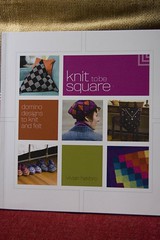First, the facts:
Title: Knit to Be Square: Domino Designs to Knit and Felt
Author: Vivan Høxbro
Published by: Interweave Press, 2008
Pages: 141
Type: Patterns, How-to.
Chapters:
1. Knit Squares and Blocks
2. Join Two Blocks into a Pouch
3. Join Three Blocks into a Pouch
4. Join Four Blocks into a Square
5. Knit Incomplete Squares and Blocks
Pattern Size Range: N/A
The In-Depth Look:
Okay … back in high school, I had a geometry teacher who, as an assignment, made us all build 3-dimensional models out of little pieces of cardstock cut into spheres … like a geodesic dome. As much as I hated struggling with the glue and paper, the concept of the construction intrigued me.
Who knew you could do the same kind of thing with yarn?
This book is more or less a sequel to her “Domino Knits,” but I have to tell you, I like this one better.
The basic technique is covered in both books. Making little squares, and then connecting them together into bigger squares and shapes to make nifty things. Much of the instruction section is pretty much the same.
But. That said? I like this book better, if only for the sheer creativity of the patterns. I mean, wow. These are not run-of-the-mill combinations. This is … fun!
I mean, really, who would have thought of taking lots of little squares and putting them together into, say, a pyramid-shaped pillow? Or a three-sided hat? Or, how about the cutest slippers ever?
The designs aren’t just squares, either? Did you know that you can make things out of half-squares, too? (And no, I don’t mean triangles.) And you can felt them, too.
The ideas in this book are great fun. Hats. Slippers. Bags. A tea cozy. Shawls. Pillows. Blankets, too, including a variation on the Amish “Sunshine and Shadow” quilt which I’ve always adored.
The illustrations–both the photographs and the graphs/sketches–are excellent. Some of the construction of these projects seems confusing at first glance, but the illustrations are clear and logical. The book is well organized, too–each new project follows on the skills learned on the one before. You certainly can jump in and begin with any one of these projects, but there’s an orderly progression if you go in sequence. (At the very least, reading the instructions in sequence is a plus.) There is also an index for techniques, and all the patterns are listed in the Table of Contents. There is a glossary for abbreviations, and the special techniques are spelled out … these are the kind of basics you expect to find in a book this well put together.
This book is available at Amazon.com.
Want to see bigger pictures? Click here.

This review copy was kindly donated by Interweave Press. Thank you!



Comments on this entry are closed.
i’m glad to read this review. this was one of the eight books i got for my birthday/christmas and i glanced through it but haven’t really gotten into it yet….something to look forward to!
beverly´s last blog post..The Road to Hell